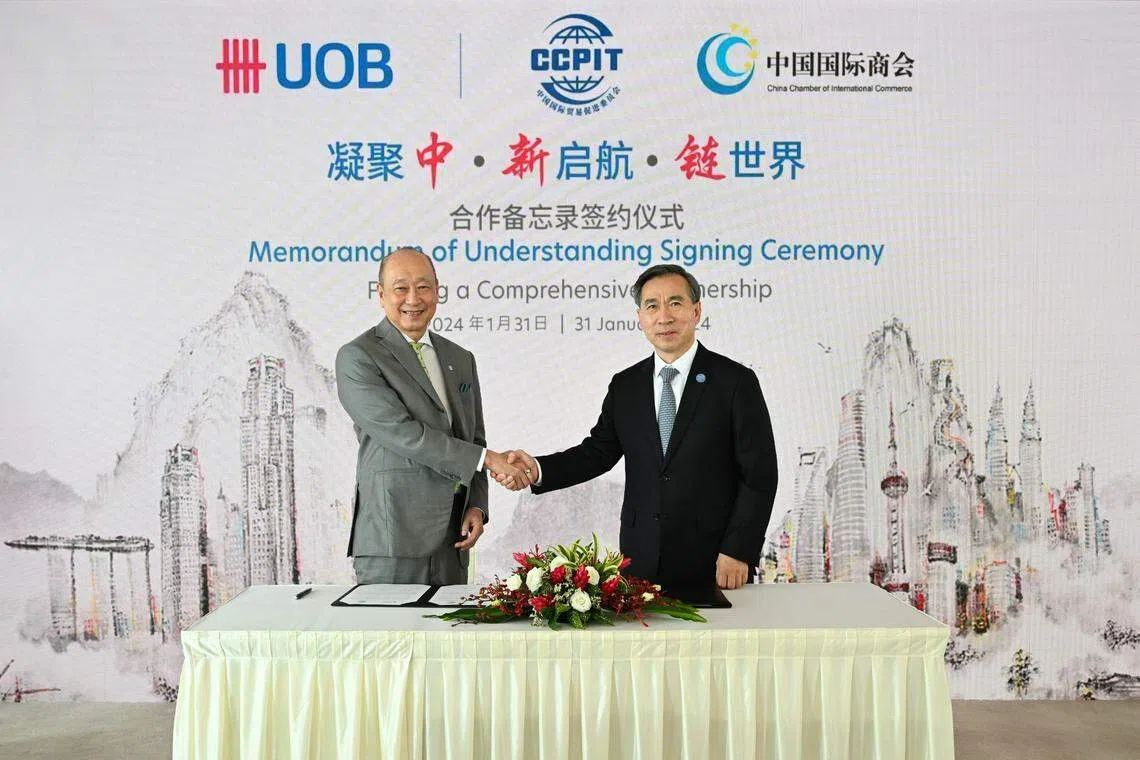UOB, China trade body renew partnership to boost Sino-Asean investment, trade flows

Zhao Yifan
LOCAL bank UOB and the China Council for the Promotion of International Trade (CCPIT) on Wednesday (Jan 31) inked an enhanced memorandum of understanding to boost foreign investment and trade flows between China and South-east Asia.
The CCPIT, which was established under China’s State Council more than seven decades ago in 1952, is China’s largest institution for the promotion of foreign trade.
This MOU – the only collaboration that CCPIT has with a bank in South-east Asia – was first signed in 2012 and renewed two years later.
It allows access for the more than 350,000 Chinese companies that are members of the China Chamber of International Commerce (CCOIC) to access UOB’s suite of local and cross-border solutions. The bank’s regional clients are also able to make use of the trade body’s network to expand into China.
The CCOIC – one of China’s largest international chambers of commerce – is an affiliated body of CCPIT that supports the overseas ventures of Chinese enterprises.
In a news release, UOB said the partnership with CCPIT leverages on the bank’s foreign direct investment (FDI) advisory unit, which is a one-stop platform to help companies set up their regional operations in South-east Asia.
Navigate Asia in
a new global order
Get the insights delivered to your inbox.
Since the unit was established in 2011, it has supported over 1,500 Chinese companies to venture overseas, of which more than 90 per cent have expanded into different parts of South-east Asia.
Since 2016, China’s foreign direct investments into Asean has increased 81 per cent from US$10.3 billion to reach US$18.7 billion in 2022. UOB said that this positive trend was a reflection of the region’s attractiveness to Chinese companies.
UOB’s head of group for FDI advisory Sam Cheong said that Asean’s regional integration has given a boost to the region’s competitiveness on the global stage.
“Despite the decrease of global FDI by about 35 per cent from 2015 to 2022, Asean has experienced a significant inflow of FDI, with the FDI stock in the region doubling during the same period,” he said.
Supply chain resilience
The expanded MOU will focus on five industries – green agriculture, smart mobility, new energy, digital technology, and healthcare – that have been identified as areas with growing market demands.
The MOU also wants to help enhance supply chain resilience along China-Asean investment and trade corridors.

CCOIC secretary-general Sun Xiao, who was in town to attend the signing ceremony at UOB Plaza, told reporters that the resurgence of the de-globalisation trend means that the stabilisation of supply chains is facing fresh challenges.
More than 100 people from major Chinese corporates and government agencies were present at the signing.
In an interview, Sun highlighted supply chains as a key focus of the Chinese government, citing the example of last November’s inauguration of China’s Supply Chain Expo that was the world’s first national-level supply chain exhibition.
He said that South-east Asia remains an attractive destination for Chinese companies that are looking for opportunities abroad.
There are several pluses in Asean’s favour, said Sun, noting the close proximity to China, a shared culture, and the fact that there are many free trade agreements (FTAs) and policies in place.
He singled out the Regional Comprehensive Economic Partnership, the Asean-China FTA, and the mutual visa exemption bilateral agreements between China and Singapore, Malaysia and Thailand.
Asked about the impact of US-China trade tensions, Sun said he believed this would not alter the demand-supply relations that govern the global supply chain.
“We hope the business environment will become more convenient for all. Although there may be frictions, the demand for Chinese companies and products will persist. It is CCPIT’s job to match this demand with the supply,” he said.
“Most of CCPIT’s collaborations remain on a government level. However, to get policies truly off the ground, we need to engage with commercial and financial institutions.”
Decoding Asia newsletter: your guide to navigating Asia in a new global order. Sign up here to get Decoding Asia newsletter. Delivered to your inbox. Free.
Copyright SPH Media. All rights reserved.




